<Back to Index>
- Prime Minister of Greece Georgios Rallis (Γεώργιος Ράλλης), 1918
- President of the Hellenic Republic Konstantinos Karamanlis (Κωνσταντίνος Καραμανλής), 1907
PAGE SPONSOR
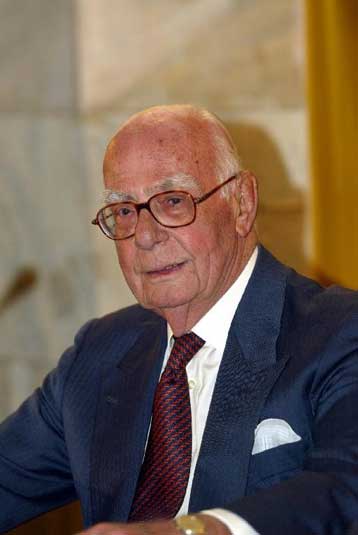
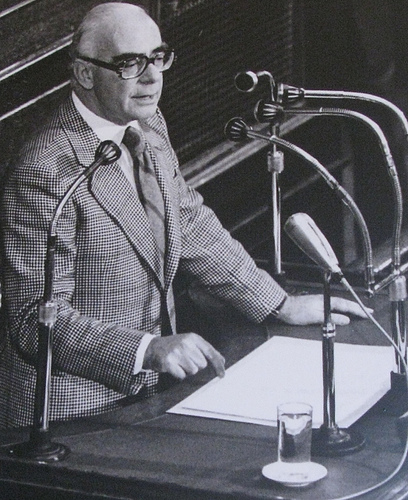
Georgios Rallis (Greek: Γεώργιος Ράλλης; 26 December 1918 – 15 March 2006) was a Greek conservative politician and Prime Minister of Greece from 1980 to 1981.
Rallis was descended from an old political family. Before Greek independence, Alexander Rallis was a prominent Phanariote (Greek from Constantinople). In 1849 his son George Rallis became Chief Justice of the Greek Supreme Court. Dimitrios Rallis (1844 – 1921), paternal grandfather of George Rallis, was five times Prime Minister of Greece, for short periods in 1897, 1903, 1905, 1909 and 1921. His son, Ioannis Rallis or John Rallis (1878 – 1946), was collaborationist Prime Minister from 1943 to 1944, during the German occupation. After the liberation of Greece he was sentenced to life imprisonment for collaboration and died in jail in 1946. His maternal grandfather, Georgios Theotokis, was four times Prime Minister of Greece, between 1901 and 1907.
George Rallis was born in the prestigious Kolonaki district of Athens, after schooling he studied law and political sciences at the University of Athens. Shortly after graduating he joined the fight against fascist Italy after the invasion on 28 October 1940. He had the rank of the junior lieutenant. During the retreat (April 1941) he had to shoot his own horse, because it was injured and stuck in the mud. He remembered with sorrow this incident in a TV interview during the 1990s.
Rallis was first elected to the Greek Parliament as a member of the People's Party in 1950, and was first appointed a minister in 1954 in the government of Alexander Papagos. He joined Constantine Karamanlis when he formed the National Radical Union and was a minister in the Karamanlis administrations until 1963.
After the military coup of 1967, Rallis was arrested and sent into exile on the island of Kasos when he said that democracy should be restored. He was later allowed to leave the country and stayed in exile until the restoration of democracy in 1974.
In 1974, Rallis returned to Greece and became Education Minister. He oversaw the educational reform, the institution of the Demotic Greek as the formal language in schools, and the reform of the school curricula. He became Foreign Minister in 1978, became the first Greek Foreign Minister to visit the Soviet Union, worked to restore relations with Bulgaria and Yugoslavia and negotiated Greece's accession to the EEC.
When Karamanlis retired in 1980, Rallis was elected leader of the New Democracy party and succeeded Karamanlis as Prime Minister. During his tenure Greece rejoined the military wing of NATO. The following year, however, he was defeated at elections by Andreas Papandreou's PASOK party, and resigned as party leader. Later he had disagreements with his successor as leader, Constantine Mitsotakis, and sat for a time as an independent MP. He retired shortly thereafter. During his retirement, Rallis established and cultivated organically farmed vineyards and olive groves at his family estate on Corfu.
Although Rallis became Prime Minister at a time when the fortunes of
his party were in decline, he remained a popular figure because of his
well liked personal attributes of mildness, modesty and
straightforwardness. A wealthy patrician by birth, he always made a
point of living modestly, walking to work (even as a Prime Minister,
much to the frustration of his security detail), and taking the time to
greet and talk with those he met on the street. He died of heart failure at his home on 15 March 2006. He was survived by his wife, Lena Rallis (née Voultsou) and their two daughters, Zaira Papaligouras and Joanna Farmakidis.
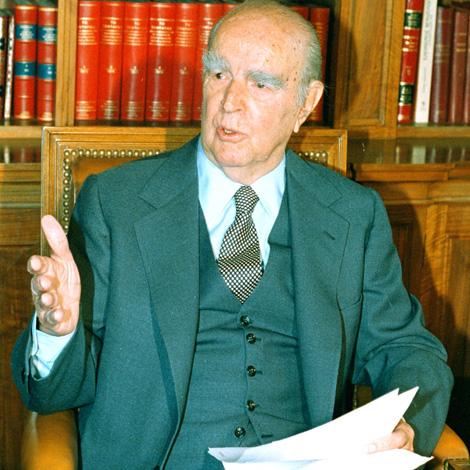
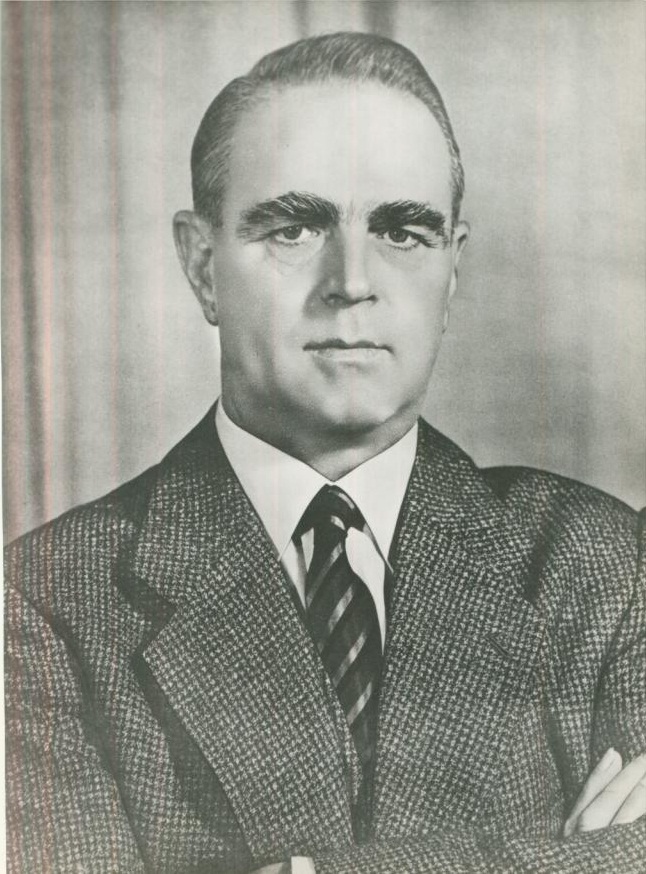
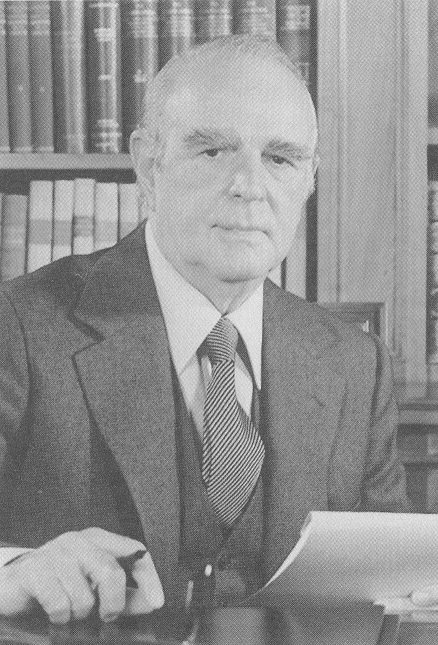
Konstantínos G. Karamanlís (Greek: Κωνσταντίνος Γ. Καραμανλής) (8 March 1907 – 23 April 1998), commonly anglicized to Constantine Karamanlis or Caramanlis, was a four - time Prime Minister, twice President of the Third Hellenic Republic and a towering figure of Greek politics whose political career spanned much of the latter half of the 20th century.
He was born in the village of Proti, Macedonia, Ottoman Empire (now Greece). He became a Greek citizen in 1913, after Macedonia was united with Greece in the aftermath of the Second Balkan War. His father was Georgios Karamanlis, a teacher who fought during the Greek Struggle for Macedonia, in 1904 – 1908. After spending his childhood in Macedonia, he went to Athens to attain his degree in Law. He practiced law in Serres, entered politics with the conservative People's Party and was elected Member of Parliament for the first time at the age of 28, in the Greek legislative election, 1936. Due to health problems, Karamanlis did not participate in the Greco - Italian War.
After World War II, Karamanlis quickly rose through the ranks of Greek politics. His rise was strongly supported by fellow party member and close friend Lambros Eftaxias who served as Minister for Agriculture under the premiership of Konstantinos Tsaldaris. Karamanlis's first cabinet position was Minister for Employment in 1947 under the same administration. Karamanlis eventually became Minister of Public Works in the Greek Rally administration under Prime Minister Alexandros Papagos. He won the admiration of the US Embassy for the efficiency with which he built road infrastructure and administered American aid programs.
When Alexandros Papagos died after a brief illness (1955), King Paul of Greece appointed the 48 year old Karamanlis as Prime Minister. The King did so, thus bypassing Stephanos Stephanopoulos and Panagiotis Kanellopoulos, the two senior Greek Rally politicians who were widely considered as the heavyweights most likely to succeed Papagos. Karamanlis first became prime minister in 1955, and reorganized the Greek Rally as the National Radical Union. One of the first bills he promoted as Prime Minister, implemented the extension of full voting rights to women, which stood dormant although nominally approved in 1952. Karamanlis won three successive elections (1956, 1958 and 1961).
In 1959 he announced a five year plan (1960 – 64) for the Greek
economy, emphasizing improvement of agricultural and industrial
production, heavy investment on infrastructure and the promotion of
tourism. On the international front, Karamanlis abandoned the
government's previous strategic goal for enosis (the unification of Greece and Cyprus) in favor of independence for Cyprus. In 1958, his government engaged in negotiations with the United Kingdom and Turkey, which culminated in the Zurich Agreement as a basis for a deal on the independence of Cyprus. In 1959 the plan was ratified in London by Makarios III.
Max Merten was Kriegverwaltungsrat (military administration counselor) of the Nazi German occupation forces in Thessaloniki. He was convicted in Greece and sentenced to a 25 year term as a war criminal in 1959. On 3 November of that year, Merten benefited from an amnesty for war criminals, and was set free and extradited to the Federal Republic of Germany, after political and economic pressure from West Germany (which, at the time, hosted thousands of Greek economic immigrants). Merten's arrest also enraged Queen Frederica, a woman with German ties, who wondered whether "this is the way mister district attorney understands the development of German and Greek relations".
In Germany, Merten was eventually acquitted from all charges due to "lack of evidence." On 28 September 1960 German newspapers Hamburger Echo and Der Spiegel published excerpts of Merten's deposition to the German authorities where Merten claimed that Karamanlis, the then Minister for the Interior Takos Makris and his wife Doxoula (whom he described as Karamanlis's niece) along with then Deputy Minister of Defense George Themelis were informers during the Nazi occupation of Greece. Merten alleged that Karamanlis and Makris were rewarded for their services with a business in Thessaloniki which belonged to a Greek Jew sent to the Auschwitz concentration camp. He also alleged that he had pressured Karamanlis and Makris to grant amnesty and release him from prison.
Karamanlis rejected the claims as unsubstantiated and absurd, and accused Merten of attempting to extort money from him prior to making the statements. The West German government also decried the accusations as calumniatory and libelous. Karamanlis accused the opposition party of instigating a smear campaign against him. Although Karamanlis never pressed charges against Merten, charges were pressed in Greece against Der Spiegel by Takos and Doxoula Makris and Themelis, and the magazine was found guilty for slander in 1963. Merten did not appear to testify during the Greek court proceedings. The Merten Affair remained at the center of political discussions until early 1961.
Merten's accusations against Karamanlis were never corroborated in a
court of law. Historian Giannis Katris, an ardent critic of Karamanlis,
has argued that Karamanlis should have resigned the premiership and
pressed charges against Merten as a private individual in German courts,
in order to fully clear his name. Nonetheless, Katris rejects the accusations as "unsubstantiated" and "obviously fallacious".
Karamanlis as early as 1958 pursued an aggressive policy toward Greek membership in the EEC. He considered Greece's entry into the EEC a personal dream because he saw it as the fulfillment of what he called "Greece's European Destiny". He personally lobbied European leaders, such as Germany's Konrad Adenauer and France's Charles de Gaulle followed by two years of intense negotiations with Brussels. His intense lobbying bore fruit and on 9 July 1961 his government and the Europeans signed the protocols of Greece's Treaty of Association with the European Economic Community (EEC). The signing ceremony in Athens was attended by top government delegations from the six - member bloc of Germany, France, Italy, Belgium, Luxemburg and the Netherlands, a precursor of the European Union. Economy Minister Aristidis Protopapadakis and Foreign Minister Evangelos Averoff were also present. German Vice - Chancellor Ludwig Erhard and Belgian Foreign Minister Paul - Henri Spaak, a European Union pioneer and a Karlspreis winner like Karamanlis, were among the European delegates.
This had the profound effect of ending Greece's economic isolation and breaking its political and economic dependence on US economic and military aid, mainly through NATO. Greece became the first European country to acquire the status of associate member of the EEC outside the six nation EEC group. In November 1962 the association treaty came into effect and envisaged the country's full membership at the EEC by 1984, after the gradual elimination of all Greek tariffs on EEC imports. A financial protocol clause included in the treaty provided for loans to Greece subsidized by the community of about $300 million between 1962 and 1972 to help increase the competitiveness of the Greek economy in anticipation of Greece's full membership. The Community's financial aid package as well as the protocol of accession were suspended during the 1967 – 74 junta years and Greece was expelled from the EEC. As well, during the dictatorship, Greece resigned its membership in the Council of Europe fearing embarrassing investigations by the Council, following torture allegations.
Soon after returning to Greece during metapolitefsi Karamanlis reactivated his push for the country's full EEC membership in 1975 citing political and economic reasons. Karamanlis was convinced that Greece's membership in the EEC would ensure political stability in a nation having just undergone a transition from dictatorship to Democracy.
In May 1979 he signed the full treaty of accession. Greece became the
tenth member of the EEC on 1 January 1981 three years earlier than the
original protocol envisioned and despite the freezing of the treaty of
accession during the junta (1967 – 1974).
In the 1961 elections, the National Radical Union won 50.80 percent of the popular vote. On 31 October, George Papandreou stated that the electoral results were due to widespread vote - rigging and fraud. Karamanlis replied electoral fraud, to the extent that it happened, was masterminded by the Palace. Political tension escalated, as Papandreou refused to recognize the Karamanlis government. On 14 November 1961 he initiated an "unrelenting struggle" ("ανένδοτο αγώνα") against Karamanlis.
Tension between Karamanlis and the Palace escalated even further as Karamanlis vetoed fundraising initiatives undertaken by Queen Frederika. On 17 June 1963 Karamanlis resigned the premiership after a disagreement with King Paul of Greece, and spent four months abroad. In the meantime the country was in turmoil following the assassination of Dr. Gregoris Lambrakis, a leftist member of Parliament, by right wing extremists during a pro-peace demonstration in Thessaloniki. The opposition parties castigated Karamanlis as a moral accomplice to the assassination.
In the 1963 election the National Radical Union, under his leadership, was defeated by the Center Union under George Papandreou. Disappointed with the result, Karamanlis fled Greece under the name Triantafyllides. He spent the next 11 years in self - imposed exile in Paris, France. Karamanlis was succeeded by Panagiotis Kanellopoulos as the ERE leader.
In 1966, Constantine II of Greece sent his envoy Demetrios Bitsios to Paris on mission to convince Karamanlis to return to Greece and resume a role in Greek politics. According to uncorroborated claims made by the former monarch only after both men had died, in 2006, Karamanlis replied to Bitsios that he would return under the condition that the King were to impose martial law, as was his constitutional prerogative.
U.S. journalist Cyrus L. Sulzberger has separately claimed that Karamanlis flew to New York to visit Lauris Norstad and lobby U.S. support for a coup d'état in Greece that would establish a strong conservative regime under himself; Sulzberger alleges that Norstad declined to involve himself in such affairs.
Sulzberger's account, which unlike that of the former King was delivered during the lifetime of those implicated (Karamanlis and Norstad), rested solely on the authority of his and Norstad's word.
When in 1997 the former King reiterated Sulzberger's allegations, Karamanlis stated that he "will not deal with the former king's statements because both their content and attitude are unworthy of comment." The deposed King's adoption of Sulzberger's claims against Karamanlis was castigated by left leaning media, typically critical of Karamanlis, as "shameless" and "brazen". It bears noting that, at the time, the former King referred exclusively to Sulzberger's account, to support the theory of a planned coup by Karamanlis, and made no mention of the alleged 1966 meeting with Bitsios, which he would refer to only after both participants had died and could not respond.
On 21 April 1967, constitutional order was usurped by a coup d'état led by officers around Colonel George Papadopoulos. The King accepted to swear in the military appointed government as the legitimate government of Greece, but launched an abortive counter - coup to overthrow the junta eight months later. Constantine and his family then fled the country.
In 2001, former agents of the Eastern German secret police Stasi,
claimed to Greek investigative reporters that during the Cold War, they
had orchestrated an operation of evidence falsification, in order to present Constantine Karamanlis as having planned a coup and thus damage his reputation, in an apparent disinformation propaganda campaign. The operation allegedly centered on a falsified conversation between Karamanlis and Strauss, a Bavarian officer of the King. They also alleged that a photograph of the former New Democracy leader Constantine Mitsotakis standing next to a uniformed Nazi officer, that had been repeatedly published by the PASOK leaning Greek daily Avriani, was in fact a photomontage fabricated in Bulgaria. Their disclosures have not been challenged to this day.
Following the invasion of Cyprus by the Turks, the dictators finally abandoned Ioannides and his disastrous policies. On 23 July 1974, President Phaedon Gizikis called a meeting of old guard politicians, including Panagiotis Kanellopoulos, Spiros Markezinis, Stephanos Stephanopoulos, Evangelos Averoff and others. The heads of the armed forces also participated in the meeting. The agenda was to appoint a national unity government that would lead the country to elections.
Former Prime Minister Panagiotis Kanellopoulos was originally suggested as the head of the new interim government. He was the interim Prime Minister originally deposed by the dictatorship in 1967 and a distinguished politician who had repeatedly criticized Papadopoulos and his successor. Raging battles were still taking place in Cyprus' north when Greeks took to the streets in all the major cities, celebrating the junta's decision to relinquish power before the war in Cyprus could spill all over the Aegean. But talks in Athens were going nowhere with Gizikis' offer to Panagiotis Kanellopoulos to form a government.
Nonetheless, after all the other politicians departed without reaching a decision, Evangelos Averoff remained in the meeting room and further engaged Gizikis. He insisted that Karamanlis was the only political personality who could lead a successful transition government, taking into consideration the new circumstances and dangers both inside and outside the country. Gizikis and the heads of the armed forces initially expressed reservations, but they finally became convinced by Averoff's arguments. Admiral Arapakis was the first, among the participating military leaders, to express his support for Karamanlis.
After Averoff's decisive intervention, Gizikis decided to invite Karamanlis to assume the premiership. Throughout his stay in France, Karamanlis was a vocal opponent of the Regime of the Colonels, the military junta that seized power in Greece in April 1967. Now he was called to end his self imposed exile and restore Democracy to the place that originally created it: Greece. Upon news of his impending arrival cheering Athenian crowds took to the streets chanting: Έρχεται! Έρχεται!' He is coming! He is coming! Similar celebrations broke out all over Greece. Athenians in their thousands also went to the airport to greet him. Karamanlis was sworn-in as Prime Minister under President pro tempore Phaedon Gizikis who remained in power in the interim, till December 1974, for legal continuity reasons until a new constitution could be enacted during metapolitefsi, and was subsequently replaced by duly elected President Michail Stasinopoulos.
During the inherently unstable first weeks of the metapolitefsi, Karamanlis was forced to sleep aboard a yacht watched over by a destroyer for the fear of a new coup. Karamanlis attempted to defuse the tension between Greece and Turkey, which were on the brink of war over the Cyprus crisis, through the diplomatic route. Two successive conferences in Geneva, where the Greek government was represented by George Mavros, failed to avert a full scale invasion and occupation of 37 percent of Cyprus by Turkey on 14 August 1974.
The steadfast process of transition from military rule to a pluralist democracy proved successful. During this transition period of the metapolitefsi, Karamanlis legalized the Communist Party of Greece (KKE) that was banned decades ago. The legalization of the communist party was considered by many as a gesture of political inclusionism and rapprochement. At the same time he also freed all political prisoners and pardoned all political crimes against the junta. Following through with his reconciliation theme he also adopted a measured approach to removing collaborators and appointees of the dictatorship from the positions they held in government bureaucracy, and declared that free elections would be held in November 1974, four months after the collapse of the Regime of the Colonels.
In the 1974 elections, Karamanlis with his newly formed conservative party, named New Democracy obtained a massive parliamentary majority and was elected Prime Minister. The elections were soon followed by the 1974 plebiscite on the abolition of the monarchy and the establishment of the Hellenic Republic, the televised 1975 trials of the former dictators (who received death sentences for high treason and mutiny that were later commuted to life incarceration) and the writing of the 1975 constitution.
In 1977, New Democracy again won the elections, and Karamanlis continued to serve as Prime Minister until 1980.
Under Karamanlis's premiership, his government undertook numerous
nationalizations in several sectors, including banking and
transportation. Karamanlis's policies of economic statism, which fostered a large state run sector, have been described by many as socialmania.
Following his signing of the Accession Treaty with the European Economic Community (now the European Union) in 1979, Karamanlis relinquished the Premiership and was elected President of the Republic in 1980 by the Parliament, and in 1981 he oversaw Greece's formal entry into the European Economic Community as its tenth member. He served until 1985 then resigned and was succeeded by Christos Sartzetakis.
In 1990 he was re-elected President by a conservative parliamentary
majority (under the conservative government of then Prime Minister Konstantinos Mitsotakis) and served until 1995, when he was succeeded by Kostis Stephanopoulos.
Karamanlis retired in 1995, at the age of 88, having won 5 parliamentary elections, and having spent 14 years as Prime Minister, 10 years as President of the Republic, and a total of more than sixty years in active politics. For his long service to democracy and as a pioneer of European integration from the earliest stages of the European Union, Karamanlis was awarded one of the most prestigious European prizes, the Karlspreis, in 1978. He bequeathed his archives to the Konstantinos Karamanlis Foundation, a conservative think tank he had founded and endowed.
Karamanlis died after a short illness in 1998, at the age of 91.
His nephew Kostas Karamanlis later became the leader of the New Democracy party (Nea Demokratia) and Prime Minister of Greece from 2004 to 2009.
Karamanlis has been praised for presiding over an early period of fast economic growth for Greece (1955 – 63) and for being the primary engineer of Greece's successful bid for membership in the European Union.
His supporters came to laud him as the charismatic Ethnarches (National Leader). Some of his left wing opponents have accused him of condoning rightist "para - statal" groups, whose members undertook Via kai Notheia (Violence and Corruption), i.e., fraud during the electoral contests between ERE and Papandreou's Center Union party, and were responsible for the assassination of Gregoris Lambrakis. Some of Karmanlis's conservative opponents have criticized his socialist economic policies during the 1970s, which included the nationalization of Olympic Airways and Emporiki Bank and the creation of a large public sector. Karamanlis has also been criticized by Ange S. Vlachos for indecisiveness in his management of the Cyprus crisis in 1974 even though it is widely acknowledged that he skillfully avoided an all out war with Turkey during that time.
Karamanlis is acknowledged for his successful restoration of Democracy during metapolitefsi and the repair of the two great national schisms by first legalising the communist party and by establishing the system of presidential democracy in Greece. His successful prosecution of the junta during the junta trials and the heavy sentences imposed on the junta principals also sent a message to the army that the era of immunity from constitutional transgressions by the military was over. Karamanlis' policy of European integration is also acknowledged to have ended the paternalistic relation between Greece and the United States.
On 29 June 2005 an audio - visual tribute celebrating Konstantinos Karamanlis' contribution to Greek culture took place at the Odeon of Herodes Atticus. George Remoundos was the stage director and Stavros Xarhakos conducted and selected the music. The event under the title of Cultural Memories was organized by the Konstantinos G. Karamanlis Foundation. In 2007 several events were held to celebrate 100 years since his birth.